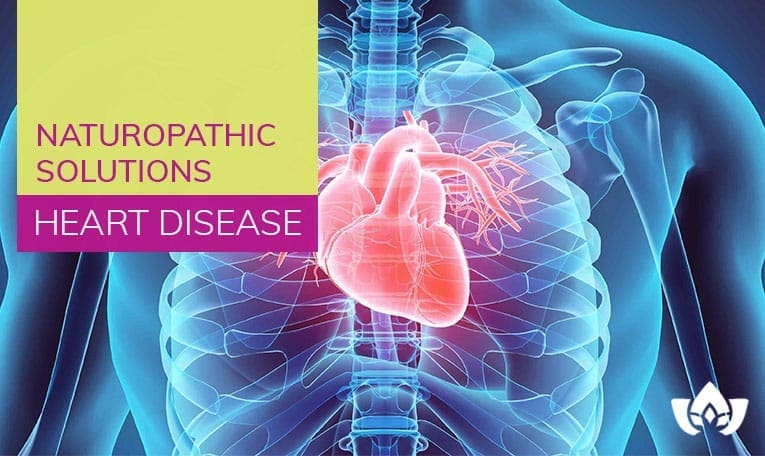
Imagine a disease – one that does not discriminate by gender or ethnicity, yet is so deadly that the CDC links it to one-quarter of all deaths in the United States.
It sounds scary.
But what if you learned that this disease is preventable in the majority of cases, and there exist many simple steps to reduce its impact on your life?
At the Mindful Healing Clinic, a naturopathic doctor in Mississauga’s clinic, we understand the potentially destructive effects of heart disease on health and quality of life.
Do you have heart disease, think you might have it, or wonder whether you may develop it in the future?
Keep reading to arm yourself with knowledge about heart disease, and take a powerful first step towards a heart-healthy life.
What is Heart Disease?
Broadly speaking, heart disease is any condition that affects the structure and/or function of the heart.
It is not one diagnosis, but a vast array of different illnesses ranging in severity from mild to life-threatening.
In all its forms, heart disease is the second leading cause of death in Canada, behind only cancer.
Anyone can be affected by heart disease regardless of age, but some people are higher-risk than others.
For example: men are twice as likely as women to suffer heart attacks, and receive new diagnoses of heart disease about ten years younger than women (55-64 years of age vs. 65-74 years of age).
Those who are elderly or have a family history of heart disease are also at higher risk of developing heart disease themselves.
It can be scary to learn that some risk factors for heart disease are beyond your control.
The good news, however, is that there are many risk factors for heart disease that you can change.
Read on to learn how to seize control of your lifestyle choices and reduce your risk of developing heart disease.
Different Types Of Heart Disease
1. Heart Failure
Heart failure occurs when your heart doesn’t pump blood as well as it should.
When this happens, the other organs and tissues in your body receive an inadequate supply of oxygen.
This can cause symptoms such as weakness, tiredness, pallor, shock, and cyanosis (a bluish colour in the skin due to inadequate oxygenation).
Additionally, as blood backs up in the circulatory system, heart failure can cause swelling of the lower extremities and fluid build-up in the lungs.
2. Coronary Artery Diseases
Coronary artery disease, also known as ischemic heart disease, occurs when the major arteries of the heart become damaged.
This commonly happens when deposits of a cholesterol-rich substance called plaque form on the walls of the heart’s arteries and obstruct the flow of blood to the heart.
The heart is starved of oxygen and nutrients, causing chest pain and shortness of breath.
3. Heart Rhythm Disorders
The healthy adult heart beats anywhere between 60 and 88 times per minute at rest, kept steady by the heart’s pace-making sinoatrial node.
However, in heart rhythm disorders, a change in the heart’s rhythm (known as arrythmia) causes it to beat too quickly, too slowly, or irregularly.
Many people with heart rhythm disorders experience a feeling of racing, thumping, fluttering, discomfort, or “skipped beats” in the heart; while others may feel faint, tired, light-headed, or short of breath.
Still others with heart rhythm disorders experience no symptoms at all.
4. Structural Heart Disorders
Structural heart disorders are conditions caused by defects or deformities in the heart’s valves, walls, or muscle.
They can be congenital (present at birth) or acquired (developed later in life due to aging, injury, or illness).
In a healthy individual, the four valves and four chambers of the heart work in a coordinated manner to push oxygenated blood out to the rest of the body.
However, when a defect is present in even one of these parts, it can cause symptoms ranging from high blood pressure to stroke.
What Causes Heart Disease?
Heart disease can seldom be traced back to any one cause, yet some factors have been linked to the development of particular types of heart disease.
These include:
• Having type 1 or type 2 diabetes
• Dealing with chronic anxiety
• Dealing with chronic stress
• Substance abuse
• A bacterial or viral infection
• Smoking
• A sedentary lifestyle

Naturopathic Solutions For Heart Disease
Although we cannot control causes of heart disease such as gender or age, we can control those which come down to our choices – like diet, exercise, supplementation, and stress.
In fact, there exist many naturopathic solutions to reduce your risk or symptoms of heart disease that are simpler than you may expect.
1. Lifestyle
What you put into your body can have a powerful and lasting impact on your overall heart health.
For example, people who smoke double their risk of developing heart disease over the course of their lifetime.
Other types of substances misuse (including caffeine, alcohol, and illicit drugs) and the resultant strain on the heart can cause some types of heart rhythm disorders.
High levels of total cholesterol and low levels of HDL (“good cholesterol”), often influenced by diet, can also contribute to the formation of plaque deposits, causing coronary artery disease and heart attacks.
But heart health doesn’t all come down to eating well and eliminating substance use.
Physical activity is another crucial piece of the puzzle, as both obesity and sedentary lifestyles are linked to the development of heart disease.
Finally, chronic emotional stress is known to cause heart disease.
Be it a demanding job, financial burdens, or family problems; reducing long-term stressors can be an important step towards preventing heart disease.
2. Omega-3 Fatty Acids
Omega-3 fatty acids, the long-chain “healthy fats” present in consumer items from seeds to supplements, have promising evidence linking them to improved cardiac health outcomes.
Specifically, some studies suggest that consumption of omega-3 fatty acids can lower blood pressure and reduce the risk of death from heart disease.
Dietary sources of omega-3 fatty acids include walnuts, flax seeds, hemp oil, fish, and eggs.
Omega-3 fatty acids can also be taken as a supplement – in the form of capsules, liquid, or even gummies.
3. Coenzyme Q10
Coenzyme Q10, or CoQ10 for short, is an antioxidant used in the growth and maintenance of cells.
Everyone produces some CoQ10 naturally, but those who have heart disease have been found to have lower CoQ10 levels than those who do not.
A 2018 study by Zozina et al found evidence that CoQ10 as a supplemental treatment for heart disease may lead to better outcomes, improved quality of life, and decreased morbidity and mortality.
Trace CoQ10 can be found in foods such as meat and nuts, but these amounts are insufficient to significantly increase CoQ10 levels in the human body.
The good news is that CoQ10 dietary supplements are widely available in many forms, including tablets and liquids.
4. Acupuncture
Perhaps one of the most exciting developments in the naturopathic treatment of heart disease is new evidence of the efficacy of acupuncture.
In a meta-analysis of acupuncture treatment in heart failure patients, Liang et. al. found multiple clinical studies suggesting that acupuncture can improve cardiac function, although its mechanism is not yet understood.
What we do know is that many acupuncture patients find it to relieve stress – a known risk factor for heart disease.
For those who think they have exhausted all avenues to reduce their cardiac risk factors, acupuncture can be one more piece of the puzzle to maximize heart health.
Book An Appointment With The Mindful Healing Clinic
Have you have been diagnosed with heart disease?
Do you think you may have heart disease?
Or, do you just want to reduce your likelihood of developing heart disease in the future?
Regardless, here at the Mindful Healing Clinic, we can help you towards the best cardiac health possible.
Call us today to book a free 15-minute consultation, during which we’ll address any questions you have and identify which solutions are best for you.
Based on our approach of complementing conventional medicine with naturopathic solutions, we’ll work together to build a treatment plan tailored to your needs and goals.
By investing in holistic care for the prevention or management of heart disease, you are investing in your future.
Contact us, the Mindful Healing Clinic, today.
Until next time,
Dr. Maria Cavallazzi, N.D
Mindful Healing Naturopathic Clinic
Mississauga, ON L5M 1L7
(905) 819-8200
► https://g.page/MindfulClinicNaturopathic
Dr. Maria Cavallazzi is a medical doctor from Colombia where she practiced as a family physician for 8 years until she moved to Canada 16 years ago and became a naturopathic doctor in Mississauga.


